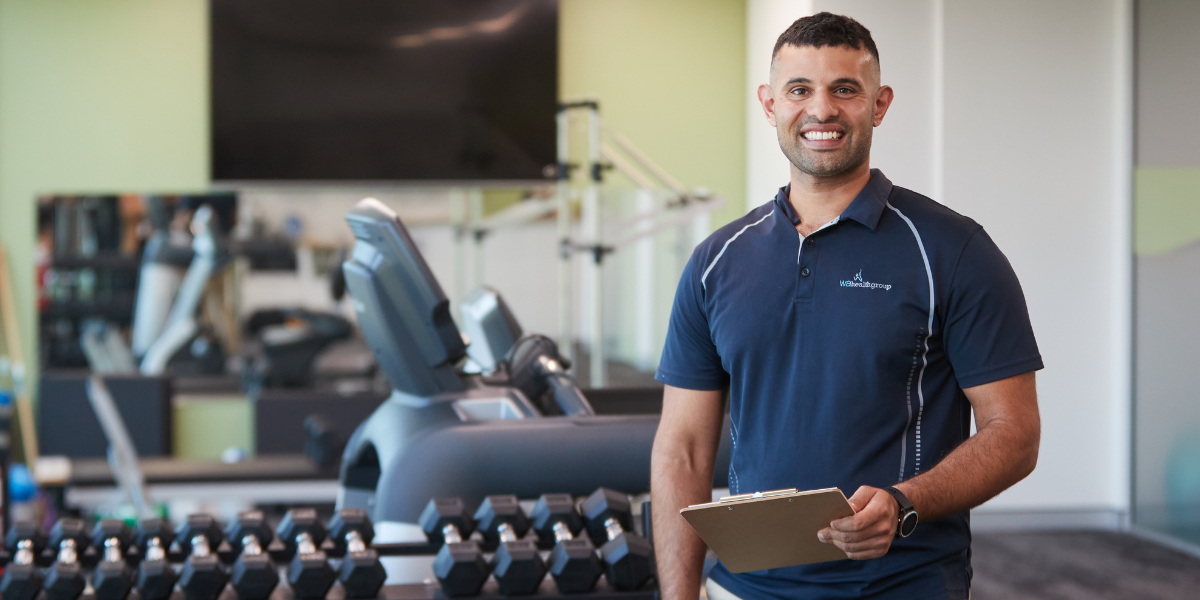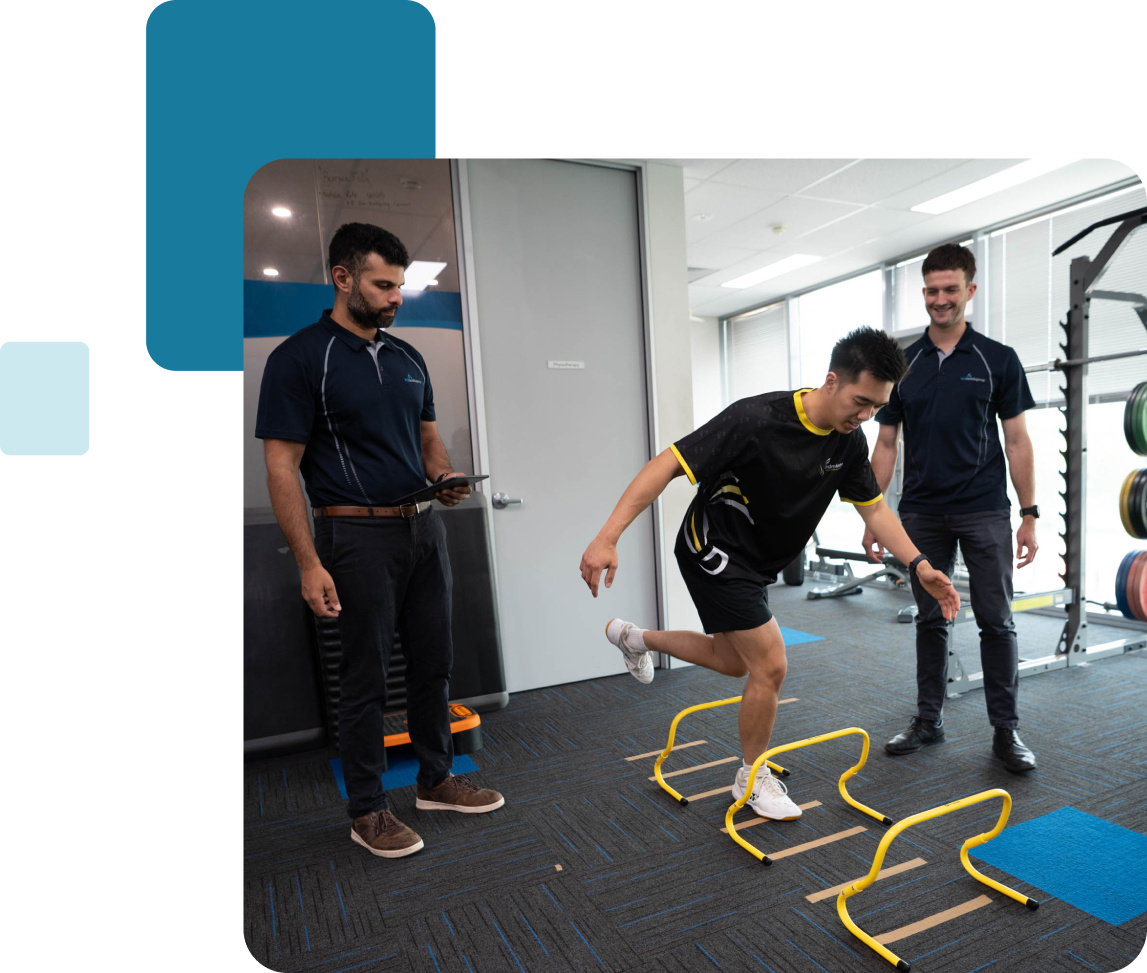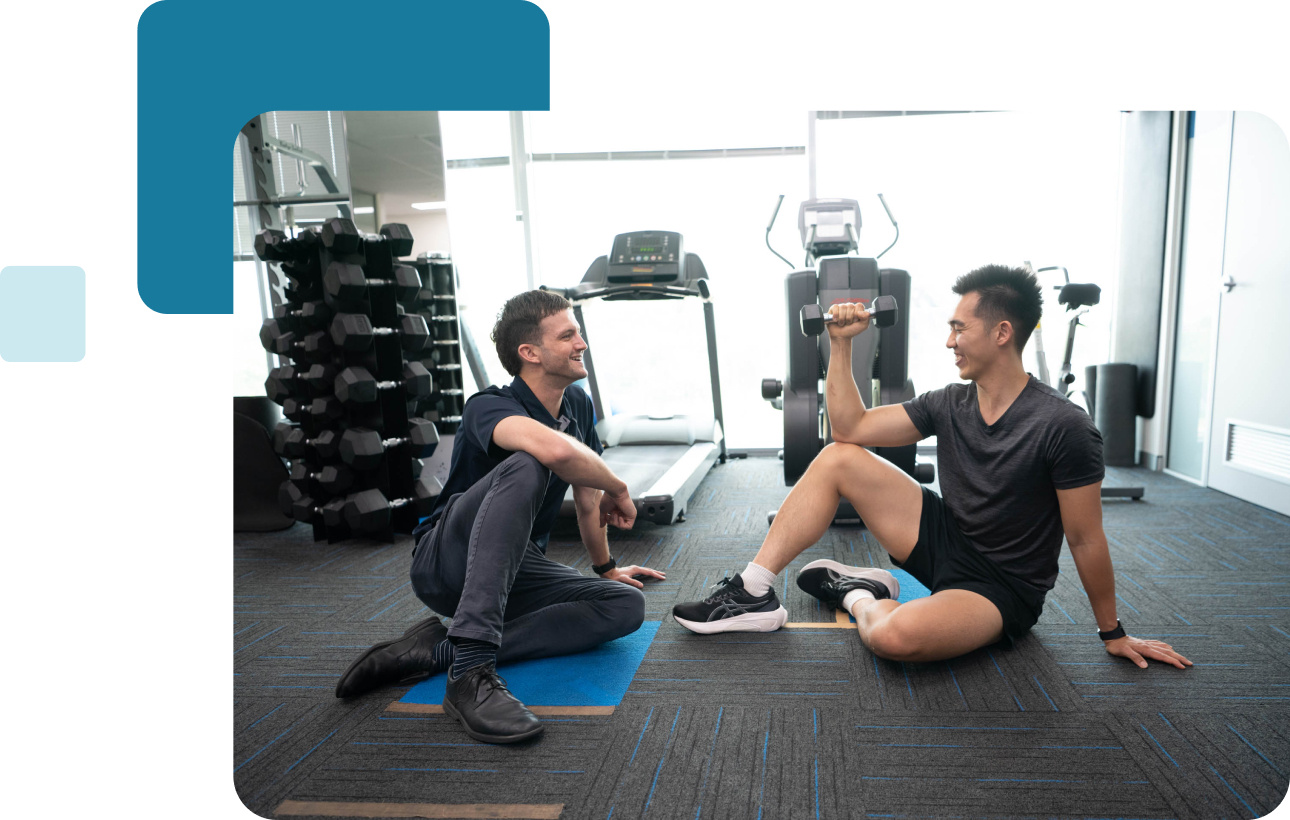Achilles Tendon Injury
Acromioclavicular (AC) Joint Injury
Ankle Sprains & Strains
Anterior Cruciate Ligament (ACL) Injury
Asthma Management for Athletes
Gastrocnemius (Calf) Strain

Our sports physiotherapists and exercise physiologists provide tailored programs to support safe recovery and performance.
Find Sports Injury Rehabilitation Programme in Bicton | Burswood | Canning Vale | Murdoch
Getting active is a great goal, whether you’re training for fitness or performance. But increasing training load too quickly or without proper recovery can lead to overuse injuries such as Achilles or heel pain.
Take James Smith, a competitive swimmer turned runner who developed overuse-related pain from intense training without a structured recovery plan. With guidance from our Canning Vale physiotherapy team, he learned how to manage his symptoms, adjust his training, and build a sustainable approach to recovery.
Our physiotherapists provide evidence-based assessment, exercise planning, and rehabilitation strategies to support safe, effective training.
Book an appointment to discuss your goals and recovery needs.
Pushing your limits can be part of progress, but without proper guidance and recovery, overtraining may contribute to fatigue or injury. When training isn’t balanced with rest, technique, and strength work, it can increase the risk of:
Muscle fatigue and weakness: overworked muscles may not recover fully, creating imbalances that contribute to sprains, strains, or stress-related pain.
Joint and tendon irritation: repetitive movements without adequate recovery can lead to tendon or joint discomfort, common in endurance and impact sports.
Reduced mobility and movement control: poor flexibility or technique can alter biomechanics, placing additional load on certain muscles or joints.
Performance decline and ongoing discomfort: overtrained muscles can become less efficient, leading to fatigue and persistent aches.
Our sports physiotherapists and exercise physiologists provide assessment, exercise planning, and load-management strategies to support effective training, recovery, and performance.

.jpg)
Preventing injuries isn’t about training harder, it’s about training smarter. These steps can help support safer, more effective exercise:
Follow a balanced program: include cardiovascular fitness, strength, and flexibility work.
Alternate muscle groups: give each area adequate recovery time.
Cool down properly: gentle stretching and mobility work can aid recovery.
Stay hydrated: dehydration may contribute to fatigue or cramps.
Stretch regularly: helps maintain flexibility and comfort.
Use appropriate gear and footwear: supportive shoes can improve stability.
Learn correct techniques: good form reduces unnecessary strain.
Listen to your body: rest when needed and avoid training through pain.
Rehabilitate fully: allow enough time to recover before returning to higher loads.
Our sports physiotherapists and exercise physiologists provide tailored advice and programs to support safe, sustainable training and recovery.
WA Health Group has extensive experience in supporting active individuals and athletes in recovering from a wide range of sports injuries. Our services are tailored to their specific needs across Perth. These include:
Achilles Tendon Injury
Acromioclavicular (AC) Joint Injury
Ankle Sprains & Strains
Anterior Cruciate Ligament (ACL) Injury
Asthma Management for Athletes
Gastrocnemius (Calf) Strain
Hamstring Strains & Tears
Meniscus Injury (Knee Pain)
Plantar Fasciitis (Heel Pain)
Quadriceps Contusion (Corked Thigh)
Shin Splints & Shin Pain
Soft Tissue Injuries
Injuries can be frustrating when you’re committed to staying active. Whether you’re an athlete or simply enjoy movement, WA Health Group provides evidence-based care to support recovery and help you return to your activities safely.
We have clinics across Perth, including Bicton, Burswood, Canning Vale, and Murdoc. Our physiotherapists and exercise physiologists follow a structured, individualised approach to sports injury rehabilitation:
Step 1: Initial Consultation
Book a 15-minute introductory appointment at one of our Perth clinics. Our sports physiotherapist or exercise physiologist will assess your condition and discuss suitable management options, which may include one-on-one sessions or exercise-based programs.
Step 2: One-on-One Consultations
During individual sessions, your clinician will guide you through exercises and techniques designed to support recovery, strength, and safe movement.
Step 3: Exercise Programs and Small-Group Sessions
As your rehabilitation progresses, you may be offered small-group or private gym sessions focusing on:
Restoring movement and strength after injury
Supporting safe return to sport or activity
Improving flexibility, endurance, and control
WA Health Group is committed to help you move with confidence through personalised and professional care.
WA Health Group provides evidence-based care to support recovery, injury management, and safe physical performance. Our experienced sports physiotherapists and exercise physiologists are available across Perth, with clinics in Bicton, Burswood, Canning Vale, and Murdoch.

Do I need a referral for sports rehabilitation in Perth?
In most cases, you do not need a referral to see a physiotherapist or exercise physiologist. However, if you are making an insurance or compensation claim, a doctor’s referral may be required.
How much does sports physiotherapy cost in Perth?
Fees vary depending on the clinic, session length, and treatment type. Standard physiotherapy sessions typically range from $80 to $150. Some private health insurance plans may cover part of the cost.
What does a sports rehabilitation program include?
A sports rehabilitation program may involve injury assessment, manual therapy, exercise prescription, mobility training, and education on safe movement strategies tailored to your sport or activity.
How can I recover from a sprained ankle?
In the early stages, the R.I.C.E. principles (Rest, Ice, Compression, Elevation) are commonly used. Physiotherapy and guided exercise programs can help restore mobility and strength as recovery progresses.
What are common approaches for runner’s knee?
Physiotherapy may include strength and conditioning, taping, movement retraining, and running technique assessment. A sports physiotherapist can help design an individualised plan.
How is plantar fasciitis (heel pain) managed?
Management may include stretching and strengthening exercises, manual therapy, and advice on footwear and activity modification.
What treatments are available for swimmers with shoulder pain?
Swimmers may experience shoulder discomfort related to overuse or muscle imbalance. Physiotherapy can include mobility work, scapular strengthening, and movement retraining.
Can I recover from a hamstring strain quickly?
Recovery time depends on the strain’s severity. Mild strains may improve with rest and graded exercise, while more significant injuries may require structured rehabilitation over several weeks.
How can I reduce my risk of injury while training for a marathon?
Gradual training progressions, strength work, mobility exercises, and running technique assessment can all support safer training. A physiotherapist can provide an individualised injury-prevention plan.
How long does recovery from a sports injury take?
Recovery varies depending on the injury type and severity. Minor injuries may take a few weeks, while more complex cases may require several months. Your physiotherapist will outline expected timeframes during assessment.
What’s the difference between one-on-one sessions and group rehabilitation classes?
One-on-one sessions provide individualised assessment and care. Group classes are more structured, focusing on supervised exercise and education in a supportive setting. Your clinician will recommend the best option for your goals.
How can I recover from overtraining?
Recovery from overtraining involves adequate rest, nutrition, hydration, and load management. A physiotherapist can help review your training schedule and recovery strategies.
Do I need physiotherapy for minor sports injuries?
Even minor injuries can affect performance or movement. A physiotherapist can assess your condition and recommend whether active treatment or simple recovery strategies are appropriate.
What exercises can help reduce the risk of running injuries?
Exercises that improve strength, mobility, and control—particularly in the hips, core, and legs—can support running efficiency. A physiotherapist can develop a tailored exercise program.
Where can I find sports injury rehabilitation in Perth?
WA Health Group provides sports injury management and rehabilitation across its Perth clinics in Bicton, Burswood, Canning Vale, and Murdoch. Our physiotherapists use evidence-based assessment and exercise programs to support recovery and return to activity.
Which clinics offer physiotherapy for sports injuries in Perth?
WA Health Group clinics in Bicton, Burswood, Canning Vale, and Murdoch provide physiotherapy and exercise physiology services for people recovering from sports-related injuries or aiming to enhance performance safely.
How is Achilles tendon pain managed?
Management may include eccentric strengthening exercises, load modification, manual therapy, and progressive rehabilitation under professional supervision.
What rehabilitation options are available for ACL injuries?
Rehabilitation for ACL injuries often involves post-surgical exercise progression, functional movement training, and gradual return-to-sport planning. Physiotherapists can guide recovery in collaboration with your doctor or surgeon.
Where can runners access rehabilitation in Perth?
WA Health Group’s physiotherapy and exercise physiology services include running assessments, strength training, and movement retraining to support injury recovery and safe performance progression.
How are football-related injuries managed?
Common football injuries include hamstring strains, ankle sprains, and knee injuries. Physiotherapists may use sport-specific exercise programs, strength training, and return-to-play assessments to support safe rehabilitation.